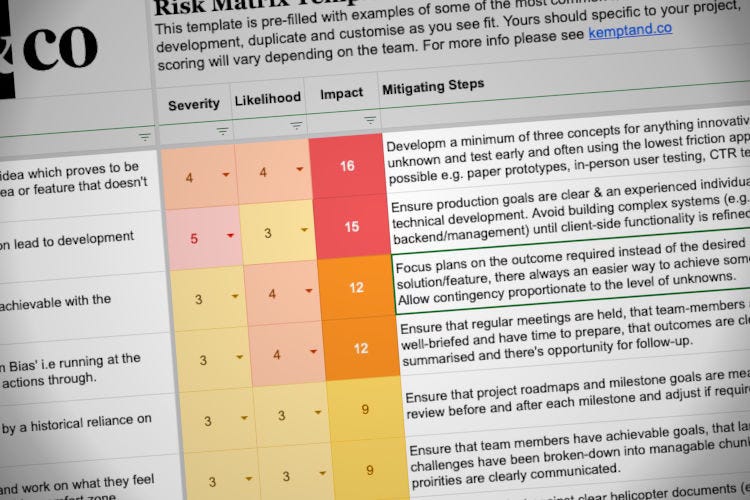Common Game & Software Development Issues
And ways to avoid them...
Developing software, particularly games, is a complex process. The larger the projects get, the more people who are involved, the bigger the challenges can become.
In order to assist teams with managing this we recently published a copy of our Risk Matrix template pre-filled with a selection of common issues that we’ve seen teams face along with suggested steps to mitigate those risks. Do take a look, I’m sure you’ll find it of use.
However, for this week's newsletter, I’d like to focus on one risk in particular - a challenge that has been haunting the games industry for years: 'crunch culture'.
Crunch in games is the practice of expecting team members to work extremely long hours, often 6 days a week, in order to achieve unrealistic deadlines which can lead to stress, sickness and burn-out issues.
Gladly this culture has started to change in recent years and the expectations of teams have generally become a lot more reasonable, but what is it that causes these issues in the first place? Why are deadlines set that are unrealistic? In my opinion it can come down to a few things:
Sometimes it’s simply over-optimism - you kinda have to be an optimist to undertake something as challenging as building a game and this can lead teams to over-promise what they can achieve (which is something their leaders need to manage) - but a lot of the time it comes down to financial pressure.
Unlike other business types, game studios are often only able to work on a relatively small number of projects at once. If one of those projects falls away, the scope creeps or it underperforms against its sales targets, the organisation can end-up having to put pressure on its teams to deliver, or over-selling what they can do in order to win new work and pay the bills.
Added to that the games industry budgets differently to other professions. In contrast to the hourly/daily rates employed by other service businesses which normally account for the fact that an individual’s time isn’t 100% productive (i.e. that time is lost to admin, training and other factors), game developers typically use resource-month rates which have barely changed in the last decade despite costs increasing significantly. This, combined with the factors above, creates further tension.
Despite these challenges I’m proud to say that during the 18 years when I ran studios we rarely had to ask for overtime and the only person ever doing 14 hour days was me! I think we achieved that with the help of the following mantras:
Under promise and over-deliver.
Focus on the goal you’re trying to achieve, not a specific solution or feature, there might be an easier way to do it.
And it takes twice as much work to fix something once it’s become broken than it does to get it right in the first place so lay your foundations carefully.
I hope you find them to be of use to you too and if you have any challenges like the ones described about do get in contact, we’d be happy to help.
Thanks for reading newsletter #2! Hope you enjoyed it and see you next week!



